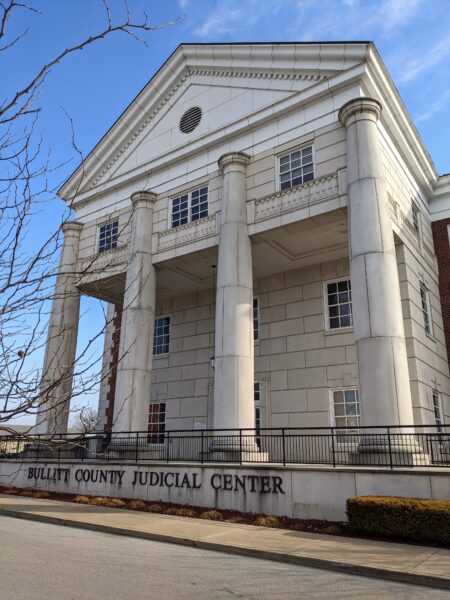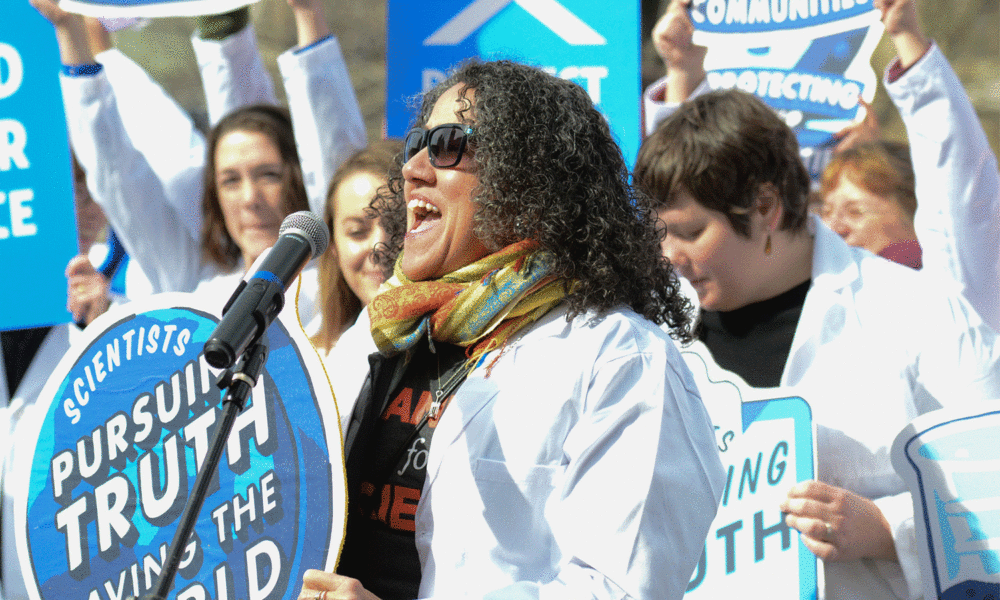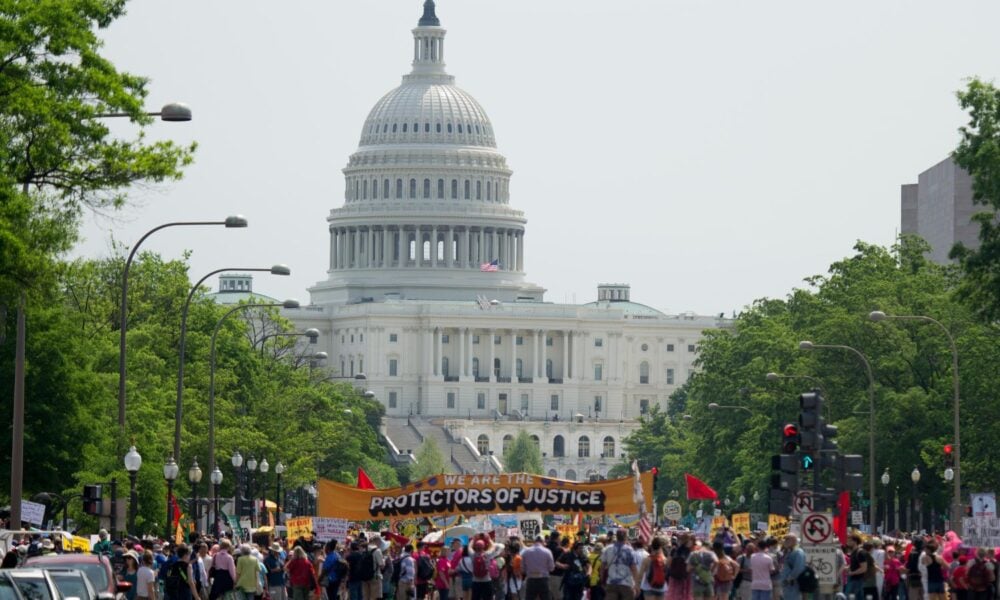On January 10th, I attended my first court hearing to observe a case in which the Louisville Gas and Electric company is suing the Isaac W. Bernheim Foundation, so they can seize land to build a new natural (methane) gas pipeline. Dozens of people wearing “Save Bernheim Forest” t-shirts showed up to demonstrate their support. I barely got in, and several folks were turned away, because the courtroom was at capacity.
(Note: I attended the hearing on my personal time and UCS does not have a position on this case.)
Science–and scientists–on trial
While I was sitting in the courtroom it struck me that one of the witnesses for the defendants is the director of conservation for the Bernheim Arboretum and Research Forest. A scientist. He has a degree in biology and natural resource conservation. In his job, he applies his expertise to protect the land, streams, and endangered species within the forest. When he was completing his studies, did he envision that he would spend years of his career in a courtroom fighting a legal battle? I’d venture to guess that he didn’t. Yet, scientists deal in facts and evidence, and those are what judges and juries look to when deciding a case, right? And in this case, science is very much on the defense.

When I got home from court and started work, the first thing I read was Dr. Rose Abramoff’s article explaining that she was fired from her government job as a scientist for displaying a banner that read, “Out of the lab & into the streets” at the American Geophysical Union’s annual conference last month. It is not unusual anymore for scientists to use their platforms to take a stand. I was reminded of the People’s Climate March, the March for Science, and the youth-led 2019 climate strike and other recent instances where people, and scientists, specifically, have taken to the streets to call for urgently needed climate action.
And that my friends, is the reason I am here today, to tell you that politics and science are inseparable.
Science is political
As a political scientist, I am interested in power, who has it, who doesn’t, and how everyday people–including scientists–can claim their power to make the change they wish to see in the world. As a policy advocate, I work every day to make sure people have the tools, resources, and knowledge they need to build climate resilience, achieve environmental justice, and move from surviving to thriving.
The Intergovernmental Panel on Climate Change (IPCC) has brought social science into the science equation in their latest report by dedicating a whole chapter on social aspects of climate action for the first time. Scientific facts and evidence make it painfully obvious that actions to reduce greenhouse gas emissions and the just transition to a clean energy economy has a wealth of health and financial benefits—let alone the benefits to life-sustaining biodiversity. Yet, a decades-long battle has been fought by the fossil fuel industry to distort science, mislead the public, and oppose meaningful climate policy so that they can continue to profit.
Enter the political factor—the struggle for influence between those who have power and those who do not.
Life is political
In conversations about how to build the sustainable, healthy, and just world we strive for at UCS, my colleague Kate Cell has often said to me, “We have the science, what we need is the political will.”
It is common to think that people exercise their political power only at the ballot box. That’s important but there are many other important things we can do, especially for people who are not able to vote based on age or citizenship! People demonstrate their power in aspects of their daily lives and in a range of actions to influence politics and, thus, policies. (If we were having a conversation face-to-face, this is when you would notice that I am basically jumping up and down with nerdy excitement).
Recall from your elementary schooling that there are three branches of government: the executive, the legislative, and the judicial. These are some of the arenas in which decisions are made that affect our lives: the Oval Office, Congress, the state legislature, city council, and courtrooms. Ideally, policy makers in each of these places are relying on the best available science and data to inform their decisions. Unfortunately, we know that is not always the case because what we often call “politics” gets in the way… though I think we really mean “special interests” or companies (and some individuals) with more-money-than-I-can-imagine that have disproportionate influence.
And that is why it is crucial that scientists recognize their power! Harness that power! And unleash that power!

People have the power
Everyone deserves a healthy place to live, work, and play, yet, there are corporations out there literally smothering us with pollution and resisting the clear, obvious, scientifically and economically sound paths forward to a brighter, cleaner tomorrow because of their greed for money. That’s why it is on us–yes you, my friend, and me!–to recognize we have power to make change. You don’t have to be a scientist to do so, of course, you are an expert in your own right based on your lived experience. What I am saying is our systems have made science political and we can no longer buy into the myth that science is outside of politics. Honestly, that’s what the villains want us to think… and why would they? Because it gives them more power!
More of our battles for a livable future are going to be fought in courtrooms. My colleague Dr. Delta Merner is the Lead Scientist for the Science Hub for Climate Litigation at UCS. She says, “Physical and social scientists are playing a critical role in the rapidly growing field of climate litigation, which—to be successful—must be informed by robust and powerful science throughout the entire legal process.”
Scientists have an increasingly crucial role to play in the courtroom, and because this may be new territory for many, UCS collaborated on this guide to help expert witnesses prepare.
My colleague Erika Spanger-Siegfried says it straight and to the point: “In this all-hands-on-deck decade, it will not be enough for climate experts to keep our heads buried in the science.”
Sometimes we will be on the offense, and sometimes we will be playing defense. More scientists are going to face scrutiny for standing up for the principles they believe in, that will make the world healthier and just. The fight won’t always be easy—or safe from consequence. Tragically, water and nature protectors across the globe have even been killed for their advocacy.
To scientists who choose to take to the streets to fight like hell for climate action, to those who are forced from their day jobs into the courtroom to preserve the land they protect, and to the everyday folks who I sat shoulder-to-shoulder with at the courtroom this month in Louisville, you are the sparks that will ignite change. For that, I believe that we will win.
For an extra dose of inspiration, I leave you with Patti Smith’s lyrics:
Listen
People have the Power by Patti Smith
I believe everything we dream
Can come to pass through our union
We can turn the world around
We can turn the earth’s revolution
We have the power
People have the power

